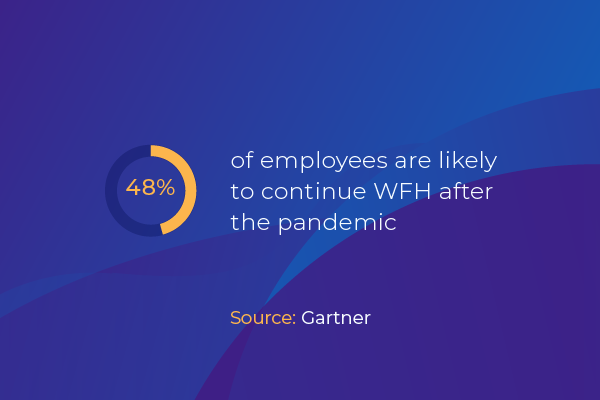Globalization has been a dominant business trend for many, many years. But the COVID-19 pandemic caused the landscape to shift and the ‘global vs local’ discussion was revived anew.
As the dust around the pandemic begins to settle (if only momentarily), it’s time to revisit the debate: Have the wide-reaching consequences of the pandemic pushed us toward a more globalized future, or a more localized one, or, interestingly, is there a move towards a dynamic interplay between both?
What are the benefits of a globalized workforce and how do they compare to that of local ones?
What are the consequences for building resilience and future-proofing business success? Here’s the CloudPay take on global vs local as we move into 2022…

The benefits of a global workforce
If we can say one thing with certainty, it’s that remote working is here to stay in one shape or form; 48% of employees are likely to continue WFH after the pandemic. As the global pandemic has changed employee expectations for working from home, so much so that people are reconsidering where they live. This is therefore encouraging globalization as jobs can be done remotely, from anywhere in the world with technology also providing the tools to support this effective collaboration across countries, time zones and cultures.
But for businesses to allow almost half their workers to work from anywhere, the advantages have to add up. So do they?
Increased revenue potential
New markets bring fresh opportunities, and by gaining access to an entirely new audience, you also have the potential to increase sales and grow your business.
Multinational businesses can also use the revenue they generate from international markets to support marketing campaigns and expansion at home. If the economy in your home country is not performing well, then expanding into a thriving foreign market lets you bypass your local economic struggles, boost your sales, and bolster the longevity of your business.
International expansion often opens doors to cheaper, offshore resources too. This can come in the form of lower-than-average local salaries, increasing the ROI of your workforce on the ground. There are also physical resources to consider: importing goods and materials from another country is far more expensive than obtaining those goods in its country of origin.
Greater access to talent
In the past, companies in emerging markets have been at a disadvantage when it comes to talent acquisition. This is due to how difficult it is to persuade people to relocate to a new country.
The good news is that now, according to a new report by Harvard Business Review’s ManpowerGroup, 8 in 10 workers want more remote work to improve their family life and contribute to a healthier work-life balance. That means businesses in emerging markets now have the chance to access top talent from anywhere in the world.
Acquiring workers with language skills and diverse educational backgrounds are a few of the advantages of globalizing your workforce. What’s more, by hiring globally, your local employees can help serve your in-market clients in a more empathetic way — who better to help you navigate the local customs and deliver product-market fit?
Having company representatives in the same time zone as your overseas clients further removes complications; nurtures relationships and improves customer service.
Stability and resilience
A stable economy is excellent for business, but it’s far from guaranteed. That’s why depending on the economic stability of one country can be detrimental long-term — it’s the equivalent of putting all your eggs in one basket, so to speak. Globalizing your workforce, however, makes it possible to be involved in multiple markets at once.
While one market feels the impact of one crisis, other countries might not be affected or affected as badly. This empowers global organizations to continue generating revenue in certain locations while channeling more energy (and even finance) to support impacted zones. Workforce resilience through globalization lowers a company’s overall risk by protecting it from the ebbs and flows of the world market economy.
Local workforce benefits
Easier to hire and collaborate
The work-from-home phenomenon has shaped how local workforces look too, but it’s still far easier to all be in the same room if you have to be. As soon as international flights — and therefore border restrictions — become involved, it’s not just budget that stands in the way, but bureaucracy too.
The vetting and onboarding process is also more straightforward when hiring from a local talent pool. Hiring internationally requires a legal entity in different countries or contractor relationships to be entered into instead. Difficult for global workforce management, but not impossible.
A happier workforce?
The jury is still out regarding the effect that remote work has on mental health. According to The Atlantic, Symptoms like loneliness, isolation, anxiety, and stress are not uncommon for full-time teleworkers. If your global team is comprised of remote workers who suffer from any of these symptoms, it will likely negatively impact your business’ output potential if left untreated.
What does this mean for payroll?
It’s clear that a more global workforce is good for business, but is it good for payroll? Adding new territories to a payroll brings with it a range of legislative, cultural, and administrative challenges, but also new opportunities play a strategic role in business growth.
With the right data and technology – and often with the support of a global payroll partner – payroll can play a vital role in supporting global expansion. With agile systems in place, payroll can quickly enable businesses to scale resources up or down in one area, helping organizations adapt to global forces often outside of their control.
When combined with human resources and finance data, payroll information also becomes an important source of insight for decision-making – feeding the boardroom with the information they need to plan for growth and expansion, as well as helping them respond to events as they happen.
Can businesses think global, but act local?
Consistency is key for long-term commercial success. Ideally, you’d want a customer in Asia to have the exact same experience of your product, service, and brand as a customer in America. This means training your workforce — whether global or local — to represent your business in the best, and very same, way.
It’s the process of thinking global and acting local; of harnessing the commercial benefits of a global workforce — revenue, resilience, stability, and skills — while retaining the local market empathy that keeps a customer loyal.
And that’s where we net out in the global vs local debate, as the world emerges from the coronavirus pandemic. Nothing compares to the risk-mitigating power of having a presence in markets all over the world, you simply need business- and people-management processes that support your global team as one.
Learn more about the importance of global payroll, and how payroll leaders can navigate the challenge of global expansion, in another CloudPay blog right here.



